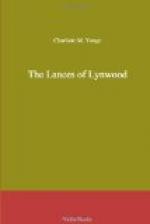There was a general cry of joy throughout the camp when orders were given that the tents should be struck and the army begin its march in the early coolness of the next morning; and, without further adventure, the Black Prince led his weakened and reduced forces over the Pyrenees back into France. Here they were again dispersed, as the war was at an end; and the young Sir Eustace Lynwood received high commendation from the Prince, and even from Chandos himself, for being able to show his brother’s band as complete in numbers and discipline as on the day when it was given into his charge.
“This,” as Chandos said, “was a service which really showed him worthy of his spurs, if he would but continue the good course.”
The peace with France, however, prevented the Prince from being desirous of keeping up the Lances of Lynwood, and he therefore offered to take their young leader into his own troop of Knights, who were maintained at his own table, and formed a part of his state; and so distinguished was this body, that no higher favour could have been offered. Edward likewise paid to Sir Eustace a considerable sum as the purchase of his illustrious captive, and this, together with the ransoms of the two other prisoners, enabled him to reward the faithful men-at-arms, some of whom took service with other Knights, and others returned to England. Leonard Ashton having no pleasant reminiscences of his first campaign, and having been stripped of all his property by his chosen associates, was desirous of returning to his father; and Eustace, after restoring his equipments to something befitting an Esquire of property, and liberally supplying him with the expenses of his journey, bade him an affectionate farewell, and saw him depart, not without satisfaction at no longer feeling himself accountable for his conduct.
“There he goes,” said Gaston, “and I should like to hear the tales he will amaze the good Somersetshire folk with. I trow he will make them believe that he took Du Guesclin himself, and that the Prince knighted you by mistake.”
“His tale of the witches will be something monstrous,” said Eustace; “but still, methinks he is much the better for his expedition: far less crabbed in temper, and less clownish in manners.”
“Ay,” said Gaston, “if he were never to be under any other guidance than yours, I think the tough ash-bough might be moulded into something less unshapely. You have a calmness and a temper such as he cannot withstand, nor I understand. ’Tis not want of spirit, but it is that you never seem to take or see what is meant for affront. I should think it tameness in any other.”
“Well, poor fellow, I wish he may prosper,” said Eustace. “But now, Gaston, to our own affairs. Let us see what remains of the gold.”
“Ah! your bounty to our friend there has drawn deeply on our purse,” said Gaston.
“It shall not be the worse for you, Gaston, for I had set aside these thirty golden crowns for you before I broke upon my own store. It is not such a recompense as Reginald or I myself would have wished after such loving and faithful service; but gold may never recompense truth.”




